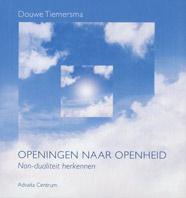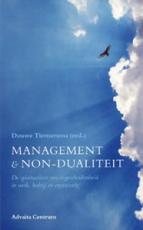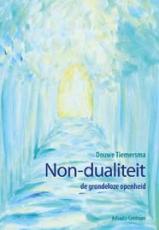Advaita Post 11-16 - From out of the transcendent...
Volume 11 n ° 16 (October 18, 2010)
--- From out of the transcendent comes the critique on all actions of a limited interest ---
It is what it is - what does that mean?
Brahmabindu Upanishad
The mind, they say is two-fold,
either impure or pure;
impure when it is attached to desires;
pure, when it is free from desires.
The mind therefore is the cause
of our bondage and liberation;
of bondage when it is attached to objects,
of liberation when it is free of them.
Because an object-less mind
is a condition for liberation,
one must strive to
empty the mind.
Whoever locks up the mind in the heart
is free from attachment to the sensory world
and the one who is freed from the mind
rises up into the highest.
Keep the mind under control so long
until it is absorbed in the heart.
This is knowledge, this is liberation,
the rest is useless book-learning.
Neither through thinking nor not thinking,
thinking and not thinking together,
does one attain Brahman,
free from every attachment.
--- From the Brahmabindu Upanishad
*
Spirituality and Society
The relationship between spirituality and human society still keeps people busy. It appeared so recently, as there has been a fierce and extensive debate in organized Buddhism (BUN, BOS). Some readers of the Advaita Post have sent in texts about it, including selections from Elseviers Weekblad July 24, 2010, and also some questions. The content of the response emails was as follows.
Yes, when there is institutionalization in a spiritual tradition, you receive darkness in the looking glass. Take a look at the Catholic Church, the Protestant church(es), and now also the Buddhist church. None of the founders ever had the grounding of a church and social compartmentalization (political parties, schools, etc.) in mind. This also applies to the very great teachers from these traditions. At times, I have thought otherwise - "still, it performs a good function ... "- but history shows that on a large scale it always goes wrong. Spirituality is primarily something in a vertical dimension and, if all goes well, secondarily it works itself through horizontally into society. With enlightenment, there is no difference between those dimensions, but when you, without having achieved the highest spirituality, use spirituality for social activities, things go wrong. Things go wrong, because ego elements simply damage spirituality, even when people have the best intentions. Christian organizations are full of such experiences. Even if one confesses his sins at the beginning of a gathering and claims to hold the "word of God" as a guiding principle, general human interests and ideas always come to the fore. The highest spirituality is simply too large, too subtle and too valuable to be used by an individual-'I' in his limited world. The spirituality that they use has, by definition, little to do with the highest. When both are brought together, the different levels become mixed. Thus, spirituality is reduced and the ego-actions receive an unjustified high status. This leads not only leads to confusion, but also to suffering.
If only there is a willingness, which is possible in this situation, of letting yourself be guided as much as possible by what you see as valuable from spirituality for society, such as minimizing the ego and group centrism. To the extent that you are not completely free of such centrism, there is a great reluctance to offer it as a basis for social organization and to appeal to everyone around you on the basis of the highest spirituality. Such a spiritual maxim can never be used as a social force against other forces. If you try, it's a travesty. So, let it be shown to what extent it is possible to be "the salted salting the earth", going into spirituality without pride. It will be possible in the degree to which the highest spirituality is realized. But the primary orientation should remain there so long as that realization has not yet occurred. The effect upon society of what has already been realized, is automatic and has nothing to do with ego actions.
Finally there is the issue of segregation, the organization of society according to beliefs. Through this separations are created and strengthened: us against the others. That can be understandable in a period where one community is seen to be in a process of emancipation, but sociological data has little to do with real spirituality. Within it, the main point still remains of seeing through separations as fictitious and leading to suffering.
What is transcendent in relation to social practice must be binding for that practice. From out of that transcendent comes the critique on all actions of a limited interest. There is constant criticism, when self-interests are at play and bosses are busy with power. From the transcendent comes the requirement of the surrender of the 'I'-person. There is always that requirement, even as the social events continue. Only through surrender does a space arise in which no separations are created any more.
The above mentioned insights are a result of people in the Advaita Vedanta who have hardly created institutions. Yes, there are the Shankaracharya monasteries and orders, but they are a marginal phenomenon and a reaction to the Buddhist foundations. Since it is about That which precedes every culture and every society, That can never be used as a legitimization for social organizations and conditions. Let's keep it that way.
With a warm greeting to everyone,
Douwe Tiemersma
Er is geen tweeheid
als je ontspannen bent
in zelf-bewustzijn
is dat duidelijk.
Boeken
Douwe schreef en redigeerde gedurende zijn leven boeken. Via onze uitgeverij zijn deze nog verkrijgbaar.



